It is within the halls of Sciences Po Paris that the CJL held its first event in France. On Monday 15 October 2018, the organisation held a colloquium on to assess counter terrorism policies in the West. Titled “The War on Terror And State Extremism”, it brought together researchers and practitioners whom are directly involved with the consequences of repression in the name of fighting terrorism.
Seventeen years after George W Bush declared it in the aftermath of 9/11, the so called war on terror began with the bombings of Afghanistan then Iraq na d the military operations have expanded ever since. To this day, Pakistan, Yemen, Somalia, the Sahel region and Mali are all under direct military attacks by western powers in the name of fighting terror. Further more, countries that have not been targeted by carpet bombings, have been subjected to intense drone warfare and/or permanent military occupation.
“French lawyers have failed to mobilise against state repression because the victims are Muslims”
Emmanuel Daoud
In his assessment of the current situation, Professor Didier Bigo opened the event with a presentation of continuous extreme practices to which public opinion has become so accustomed that it is no longer paying attention: “It is like drinking poison one drop at a time. You get accustomed to it but you’re still filling your body with poison”. Felix Treguer, founding member of online privacy group La Quadrature Du Net exposed the daily reality of mass surveillance in France since the passing the 2015 law allowing the French to destroy any sense or claim to privacy in France despite the Edward Snowden revelations and despite the proven incapacity for mass surveillance to prevent terrorist attacks. Among the raised issues, was France’s decision to outsource its intelligence big date analysis to US based Palantir which in turn raises questions about the country’s sovereignty. Palantir has been financed from its inception by the CIA’s In-Q- Tel fund and is currently headed by Peter Thiel, a staunch supporter of US President Donald Trump.
State overreach was illustrated by CAGE Director Mr Muhammad Rabbani who presented his case before the audience. In 2017 he was stopped at the London Heathrow Airport and asked to give his phone and personal computer passwords. Airport authorities used the UK’s Schedule 7 which allows such demands with the threat of imprisonment should individuals fail to comply. Mr Rabbani refused to comply given the highly sensitive information he had in his possession as a lawyer. But client to lawyer privileges were ignored by airport officials and Mr Rabbani has given account of the prosecution and subsequent trial for protecting his right to privacy. Today Mr Rabbani is still facing the risk of being jailed for such refusal to allow his privacy to be violated by the British state.
“We are sipping poison one drop at a time and getting accustomed to it. But we’re still poisoning ourselves”
Didier Bigo
Emmanuel Daoud, lawyer at the International Criminal Court took the floor to give a detailed analysis of the current antiterror legislation and how the French Government has allowed loose definitions of radicalisation to be used against Muslims. Passed thanks to identity politics and permanent controversies surrounding Muslims, the laws are not only dangerous for minorities as shown during the state of emergency which has become permanent since October 2017, but also for the very notion of the rule of law in France. Baseless denunciations have become grounds to prosecute individuals on the pretext of threat to national security. Mr Daoud also rang the alarm bell on France’s intelligence services use of “white notes” to have individuals prosecuted, raided or put under house arrest. He reminded the audience that such “white notes” are unsigned, non dated documents written by any intelligence officer that in and of themselves do not prove anything but which are now used in courts as proofs. Having been on the first line to question the government’s freedom destroying laws, he turned to his fellow lawyers in France towards whom he expressed disappointment for failing to be mobilised against France’s drastic legislation “because the victims are Muslims”.
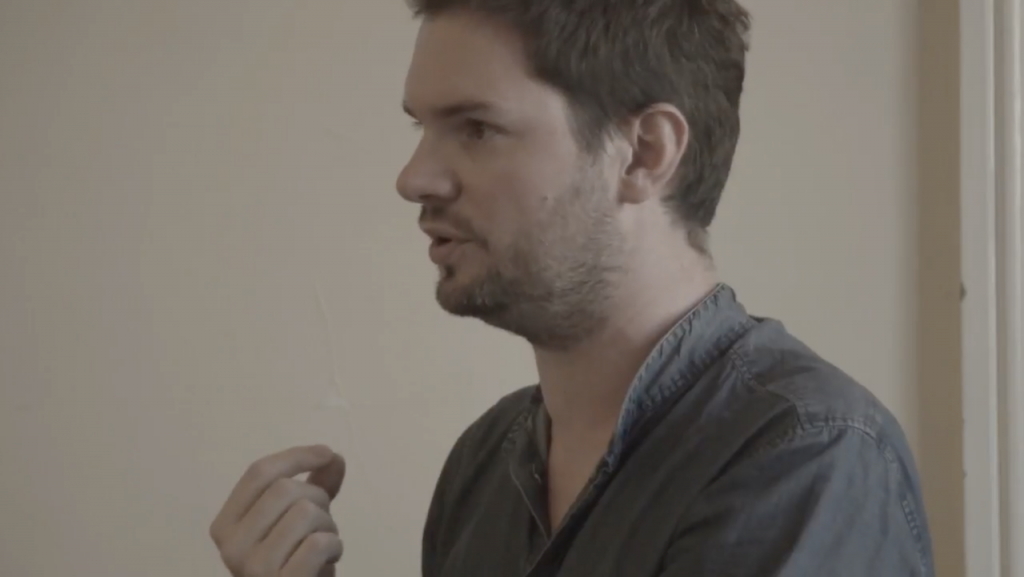
Dr Francesco Ragazzi
“I am tired of having to explain why privacy matters. We all have something that we want to keep private, otherwise we wouldn’t have doors, door locks and curtains in our homes” Felix Treguer, La Quadrature Du Net
In his presentation of the latest survey published, Dr Francesco Ragazzi from the University of Leiden concluded that France’s official counter “radicalisation policies have by far targeted French Muslims with a growing feeling of alienation.. According to the survey:
- About one in three respondents of the Muslim group “avoid saying what they think” about controversial issues related to foreign policy (30.6%) or societal issues (30.5%). This response is however similar to that of the control group (respectively 25.9% and 28.7%). Self-censorship is therefore widely diffused, and slightly higher among the Muslim group.
- On the other hand, 79.8% of the Muslim group and 84.4% of the control group have not changed their habits when it comes to online privacy. The minority that claims to be careful is however twice as important among the Muslim group (9.2% against 5%).
- Counter-terrorism has little impact on the more visible aspects of religion such as clothing (traditional dress, veil or headscarf). 86.7% of Muslims declare not having changed the way they dress. However, the minority who responds positively (8.5%) is 5 times larger than the control group (1.6%).
- More than a third of the Muslim group (38.5%) no longer read or watch certain media because of their treatment of Muslims. This concerns young people in particular (41.9%). The figure increases further (43.7%) when it comes to media coverage of terrorism issues.
- About a quarter of respondents (26.1%) say they are careful with what they say to educators and social workers for fear of being discriminated against. This figure is lower for doctors and nurses (19.7%).
- In addition, 41.7% of Muslims between the ages of 45-64 claim to ask their children to “be careful with what they say at school”, in order to avoid being discriminated against.
- Finally anti-terrorism has a significant impact on Muslim charities: almost a third of Muslims (36.9%) say “think twice about donating to a charity”.

Dr Jalila Sbaï
Senior lecturer at SciencesPo Paris and King’s College and well known for his work on international security and conflicts, Professor Didier Bigo intervened to highlight the “continuity of extreme measures” that although forgotten from public debate, are nevertheless present in our daily lives. “We are sipping poison, one drop at a time, we may get accustomed to it, but we’re still poisoning ourselves”.
“Ce que nous vivons aujourd’hui trouve ses racines dans la politique coloniale de la France et la politique d’exception qui ciblait les populations issues des colonies” Jalila Sbaï
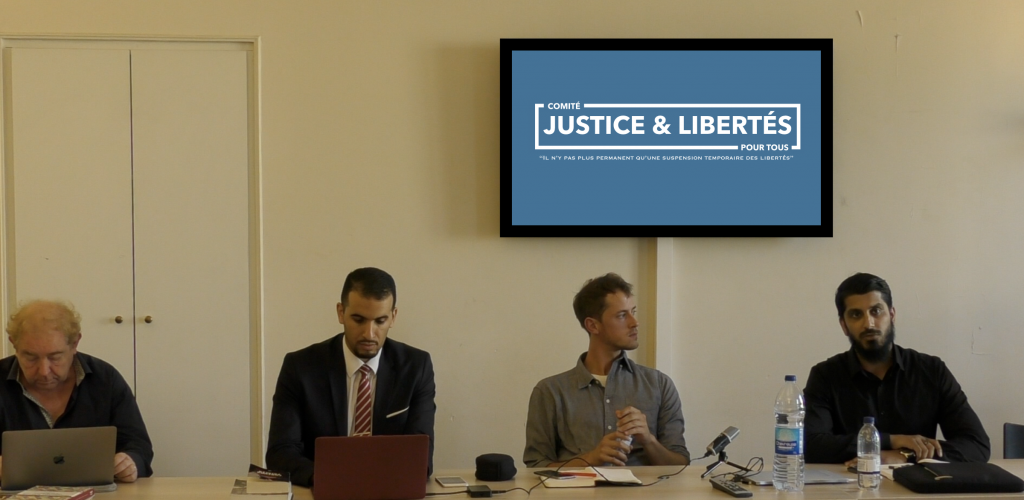
From left to right: Pr Didier Bigo, Yasser Louati, Felix Treguer, Muhammad Rabbani
Historian and researcher at the College de France, Dr Jalila Sbaï took the floor to give a historical perspective to the current combination of racism and counter-terrorism. In presenting some of the findings of her latest book “La Politique Musulmane de la France” (The Muslim Policy of France), she explained to the audience that exceptional measures targeting Muslims on French soil were not new. Colonial practices may have evolved and become more sophisticated with time but the core problem remains the same. There is the rule of law for everyone unless you were from the colonies. The 2016 violent controversy surround then socialist President François Hollande to strip of their citizenship any person convicted of acts of terrorism if they were born in France clearly illustrated such approach to French identity and national security.
Furthermore, this year the quiet annual reflections on the 2003 invasion of Iraq were granted slightly more media attention than usual thanks to its quindecinnial mark; yet there remains still a lack of meaningful acknowledgement, and response to, the uncountable death count, estimated by some to be as high as2.4 million, of the true gravity of the violence inflicted, and of its ongoing and longlasting legacy, not least the destructive politics which it has spurned.
“PREVENT is diverting ressources away from pupils with desperate needs in order to fund a failed but nevertheless ideologically fuelled counter terrorism policies” Muhammad Rabbani

And as with all wars driven by western imperial powers, the devastating and authoritarian politics driven by imperialist interventions always comes home. The US and UK’s domestic variant of the War on Terror that was cultivated and sustained at home in parallel to the bombs and missiles dropped over Iraq and Afghanistan has bred an arsenal of measures now readily available to the state in the name of securitisation. The mobilisation of popular consensus in support of laxer extradition arrangements with the US, indefinite detention, deportation ‘with assurances’, citizenship deprivation, passport removals, secret justice and more required the identification of a suspect population. Muslims criminalised as terrorism suspects became a suitable target.
And so over the course of the 2000s legislative measures to counter terrorism proliferated and the law helped to legitimate the enforcement of authoritarian interventions that might otherwise be exposed for failing to adhere to human rights and civil liberties. In contrast to extraordinary rendition and its variant ‘rendition to justice’ which were condemned by the Council of Europe, extradition to supermax prisons in the US with the prospect of incarceration for 80-100 years and lengthy periods in solitary confinement was approved by the European Court of Human Rights. These judgements set a precedent, making transfers that were otherwise laborious and deeply scrutinised processes much more viable and much more cavalier. Disciplinary practices that were difficult to achieve, even if theoretically possible in the late 1990s/early 2000s, were being enacted rather quickly and efficiently by 2015.
Legal legitimation and rationalisation of this range of punitive measures has depended on dehumanisation, on the making of non-humans. The racially charged language of terrorism, of the terrorist suspect amongst us, that effectively and explicitly connects imperialism overseas to racism at home, has not only helped to normalise and advance preemptive policing, it has provided a suitable emotive trope against which the most intense authoritarian measures have been institutionalised, seen as valid and necessary to police those racialized subjects demonised to be exceptionally heinous. Terrorism, now the catchall descriptive term used to define the political behaviour of Muslims, is framed as the antithesis of liberalism rather than as an integral part of it, and so used to sanction the most excessive forms of punishment which continuously push the bounds of disciplinary possibility within domestic civilian carceral systems.
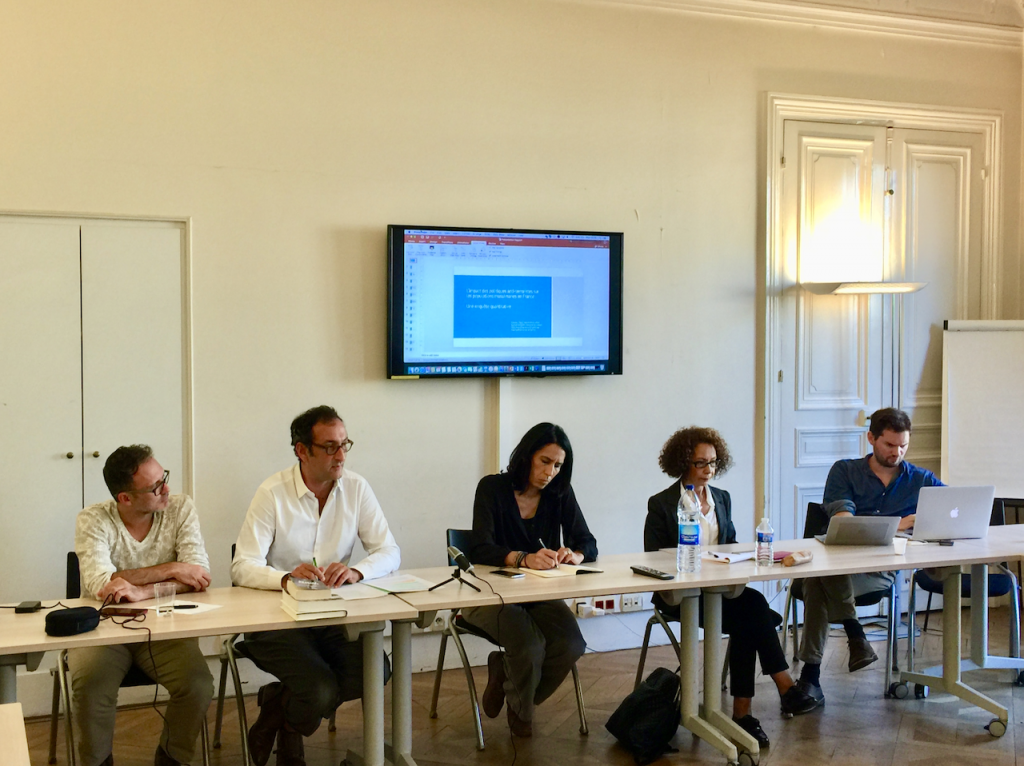
From left to right: Akos Kepper, Emmanuel Daoud, Anissa Righi, Jalila Sbaï, Francesco Ragazzi
Of late, the demonic pantomime tropes of Muslim ‘extremists’ that were incorporated into the earlier phases of the War on Terror and which did much ideological work to secure populist appeal for intensifying multiple authoritarianisms appear less frequently, and when they do at least, do not carry the headlines in the way they once did. There is no longer any need. The ideological work of the War on Terror has been done. The latest phase of this enduring war is in some ways characterised by its militarism of the shadows. Hundreds more are experiencing the authoritarianisms that earlier high profile cases of Muslim men extradited, deported, rendered and/or deprived of their citizenship helped to cultivate with little noise at all. And this is not without broader consequences and ramifications. Indeed, the point about mobilising against the racist nature of policing is not simply to condemn the disproportionate targeting and disciplining of racially Othered bodies but to denounce the more pertinent issue that the pathologisation of black and brown subjects functions as a necessary prerequisite for the justification of the cultivation of authoritarian policing (and related state disciplinary practices) in the first place.
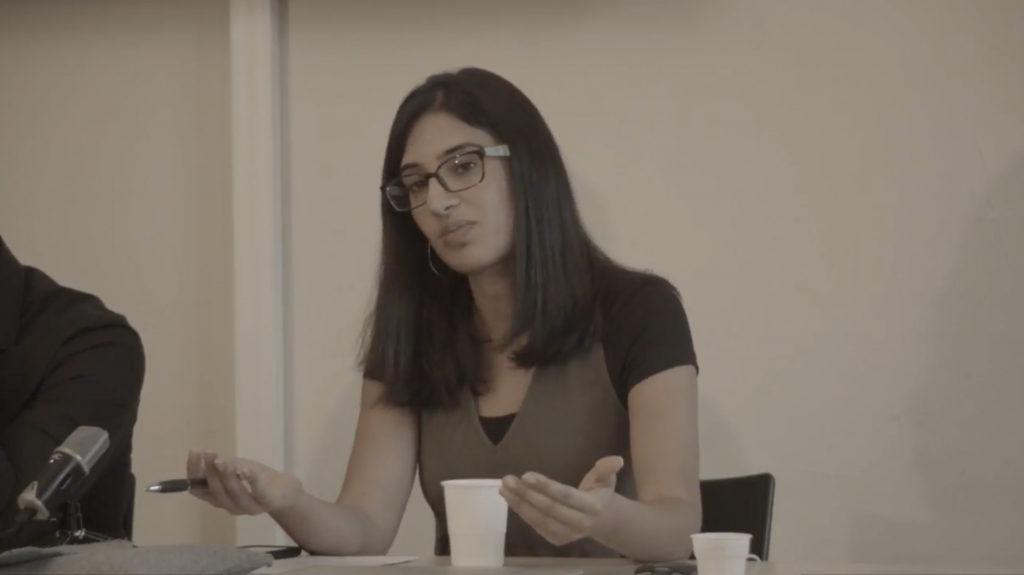
Dr Nisha Kapoor
And so this is the rub about extradition. It is not simply that it illuminates the global nature of policing that the War on Terror has relied on and extends, but that it allows the criminalisation and prosecution of the Muslims subjected to it to evade any transparent justice system. It relies on a system of punishment first, prosecution second, and the identification of a crime last of all. It is not simply that it forms part of a system of counterterrorism policing that criminalises non-violent offences, behaviours that in other contexts might be defended as the right to freedom of speech and freedom of expression, a system based on pre-emptive policing and guilt by association. But that it forms part of a system of policing that experiments with a system of justice that has little to do with justice at all, one that evades transparency or independent scrutiny, making use instead of immigration courts, lengthy pre-trial incarceration, citizenship deprivation, passport removals and most recently family courts with increasing numbers of care orders being taken out against parents accused of radicalising their children.
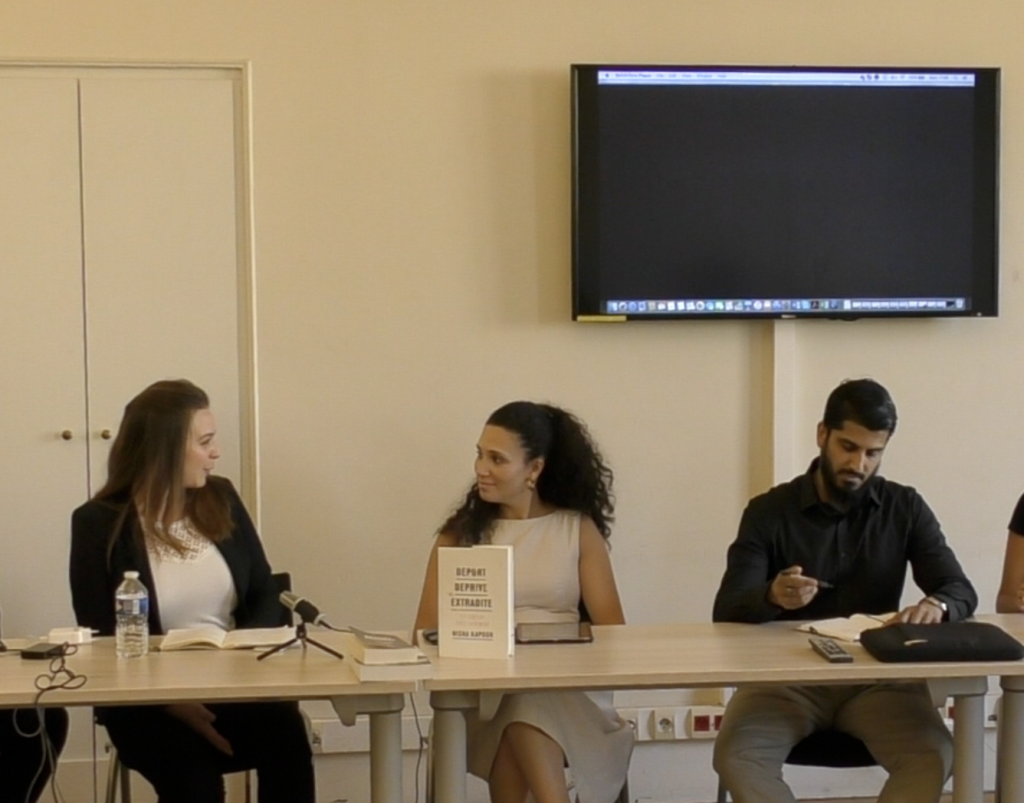
Malia Bouattia (right) speaks to Tara Dickman on her experience in the British student movement
And so the criminalisation of Muslims in the name of fighting terrorism reveals much more about the law and order society several stages further on, about the full scope of security apparatus of the state than it does about the nature of any genuine threat from below. Counterterrorism policing functions to help further advance and harden the security state, it operates to protect the state in the name of national security. High profile terrorism cases help to illuminate, for example, the cultivation and legitimation of a robust system of secret justice that was germinated in immigration courts tasked with the remit of dealing with appeals against deportations on national security grounds. Now, the system of closed evidence allowed for in Special Immigration Appeals Commissions which denies those facing deportation and their lawyers access to all the evidence against them has made its way into other courts too.
At the same time the citizenship deprivation legislation that was fostered in the name of Abu Hamza in 2002 has progressed so that in 2014 legislation was passed which allows the Home Secretary to make someone stateless if she believes they can acquire citizenship elsewhere. When Minh Pham was extradited in 2015 he lost his citizenship too and now sits outlawed in solitary confinement. This, an integral part of the ever expanding deportation regime, sits at the extreme end of a broader trend towards increasingly precarious citizenship where government asserts explicitly and sanctimoniously that ‘citizenship is a privilege not a right’.
High profile terrorism cases have also been instrumental in mobilising support for calls by government and sections of the (mostly right-wing) media to withdraw from the European Convention on Human Rights, to some extent exposing the lack of genuine regard for inclusive civil liberties and protections, but ultimately enabling a retreat from supra-national judicial oversight of government action. The ambivalent role of the European Court of Human Rights in relation to terrorism cases notwithstanding, the desire by certain sections of the British state to move away from external judicial oversight is part of the same logic underpinning the expansion of secret justice. Namely, it reflects a realignment of judicial procedures in favour of state protection. In the same way that secret courts and secret evidence protect the government from public revelations that it has been complicit in practices that contravene standard democratic principles, such as involvement in torture and clandestine detentions, part of the desire to circumvent the European Court is to impede judicial checks that constrain and admonish the state for its disciplinary excess, not least those military interventions inflicted on Iraq.
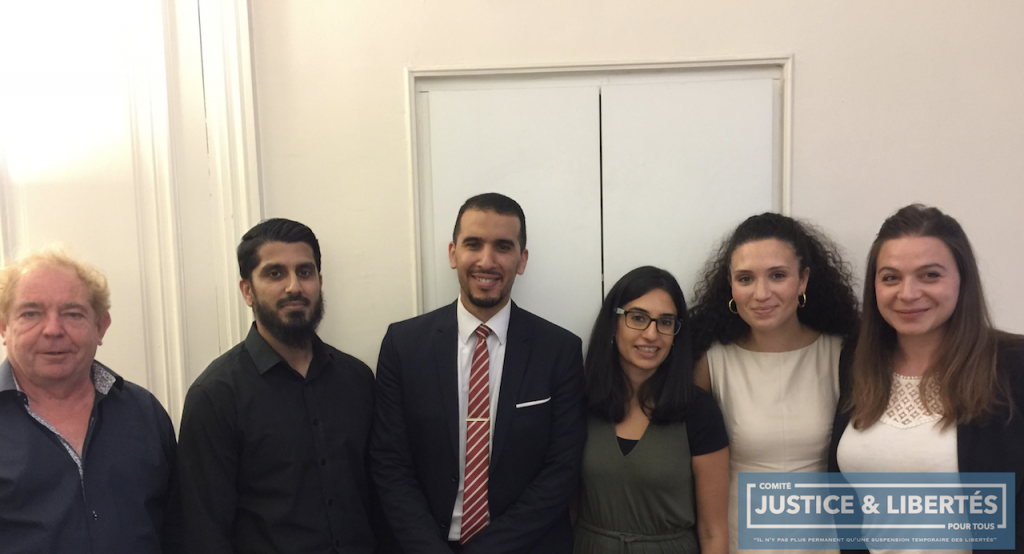
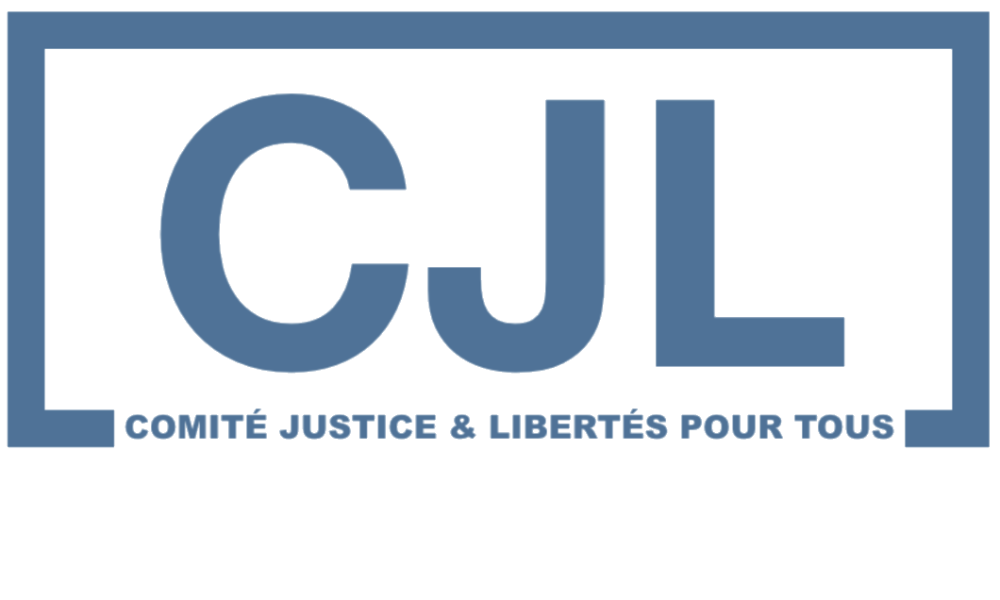
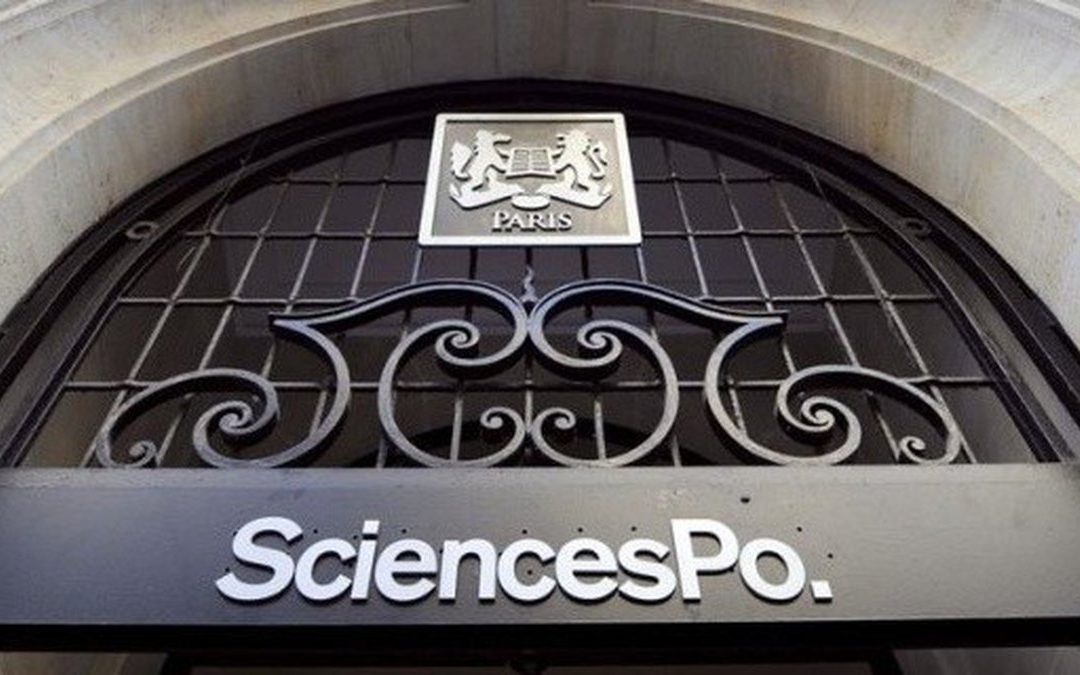
Did you guys hear the news from Senator Bernie Sanders? It sounds like Bernie plans to end whistle blower prosecution. That sounds like something Edward Snowden would want to hear more about! That is if it actually happens of course…